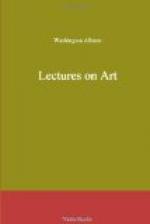But is it not the business of the artist to touch the heart? True,—and it is his high privilege, as its liege-lord, to sound its very depths; nay, from its lowest deep to touch alike its loftiest breathing pinnacle. Yet he may not even approach it, except through the transforming atmosphere of the imagination, where alone the saddest notes of woe, even the appalling shriek of despair, are softened, as it were, by the tempering dews of this visionary region, ere they fall upon the heart. Else how could we stand the smothered moan of Desdemona, or the fiendish adjuration of Lady Macbeth,—more frightful even than the after-deed of her husband,—or look upon the agony of the wretched Judas, in the terrible picture of Rembrandt, when he returns the purchase of blood to the impenetrable Sanhedrim? Ay, how could we ever stand these but for that ideal panoply through which we feel only their modified vibrations?
Let the imitation, or rather copy, be so close as to trench on deception, the effect will be far different; for, the condition of relation being thus virtually lost, the copy becomes as the original,—circumscribed by its own qualities, repulsive or attractive, as the case may be. I remember a striking instance of this in a celebrated actress, whose copies of actual suffering were so painfully accurate, that I was forced to turn away from the scene, unable to endure it; her scream of agony in Belvidera seemed to ring in my ears for hours after. Not so was it with the great Mrs. Siddons, who moved not a step but in a poetic atmosphere, through which the fiercest passions seemed rather to loom like distant mountains when first descried at sea,—massive and solid, yet resting on air.
It would appear, then, that there is something in truth, though but seen in the dim shadow of relation, that enforces interest,—and, so it be without pain, at least some degree of pleasure; which, however slight, is not unimportant, as presenting an impassable barrier to the mere animal. We must not, however, be understood as claiming for this Relative Truth the power of exciting a pleasurable interest in all possible cases; there are exceptions, as in the horrible, the loathsome, &c., which under no condition can be otherwise than revolting. It is enough for our purpose, to have shown that its effect is in most cases similar to that we have ascribed to Truth absolute.
But objections are the natural adversaries of every adventurer: there is one in our path which we soon descried at our first setting out. And we find it especially opposed to the assertion respecting children; namely, that between two things, where there is no personal advantage to bias the decision, they will always choose that which seems to them true, rather than the other which appears false. To this is opposed the notorious fact of the remarkable propensity which children have to lying. This is readily admitted; but it does not meet us, unless




